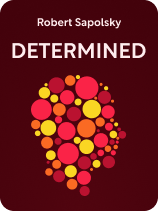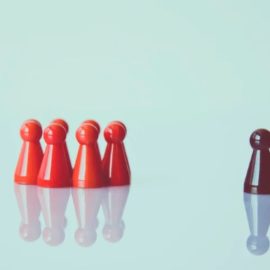

This article is an excerpt from the Shortform book guide to "Determined" by Robert Sapolsky. Shortform has the world's best summaries and analyses of books you should be reading.
Like this article? Sign up for a free trial here.
What would life be like there’s no free will? How would society function if we accepted that our actions are predetermined?
In his book Determined, Robert Sapolsky explores the concept of life without free will and its implications for society. He argues that embracing determinism could lead to a fairer and kinder world, despite the challenges it presents to our traditional notions of praise, reward, blame, and personal responsibility.
Read on to learn Sapolsky’s perspective on human behavior.
Implications of Life With No Free Will
There are enormous psychological and societal implications to life if there’s no free will, but Sapolsky argues that embracing determinism would be largely positive for society.
We’ll begin by explaining what it would be like to live in a world where people aren’t praised or rewarded for their achievements (because those achievements weren’t the result of their decisions). Next, we’ll examine the implications of a world where people aren’t blamed or punished for their actions. Finally, we’ll discuss why Sapolsky believes that such a world would be fairer and kinder than our current individualistic society.
Implication #1: No Praise or Rewards
If free will doesn’t exist, then by definition people aren’t responsible for their own actions. Sapolsky says that, if we follow that line of thought to its conclusion, it suggests that people shouldn’t be praised or rewarded for the things they accomplish. However, he also recognizes that this goes against human nature in several crucial ways.
1) It goes against our natural drive to compete. This doesn’t just mean our drive to prove that we’re better than our peers, but also our ancient drive to compete for resources. Why do anything if we won’t be rewarded for it? For instance, why enter a competition if there’s no trophy to win? Why go to work if we won’t get paid? Again, what’s the point of doing anything?
2) It goes against our natural desire for recognition. We want our efforts to be recognized and our accomplishments to be praised. If nobody’s going to be proud of us—including ourselves—then what’s the point of achieving anything?
3) It goes against our natural need for control. We like to believe, and centuries’ worth of culture have taught us, that we can take control of our lives through discipline and hard work. Therefore, we naturally resist the idea that we’re not in control and never can be. It’s hard to accept that all of our hard work and everything we’ve achieved are just our winnings from some cosmic lottery.
The Point: The Common Good
As you’ve just seen, a common concern about a deterministic world is that there seems to be no point to doing anything, since you won’t get recognition or rewards for what you accomplish. In response, Sapolsky offers two reasons why your efforts would still be worthwhile: a selfish motivation and a selfless one.
From a selfish perspective, anything that improves the world around you will also make your own life better. For example, working to keep your neighborhood clean would improve your quality of life, even if nobody personally thanks you for it.
From a selfless perspective, Sapolsky argues that if you’re concerned about praise and rewards in the first place, then you’re almost certainly coming from a position of relative privilege. This is because people who have to scrabble for basic necessities like food and shelter don’t have the luxury of worrying about such things.
Therefore, the author urges you to improve the world, not for your own benefit, but for the benefit of people who are less fortunate than you.
Implication #2: No Blame or Punishment
While many people won’t want to give up on getting rewarded for what they do, Sapolsky says that the opposite side of this issue (giving up on blaming and punishing people for wrongdoing) will also spark fierce resistance. One major reason people will cling to the idea of accountability is that human brains are hardwired to search for answers. This is to say, we naturally want to know why something happened and what we should do about it.
Unfortunately, we also tend to look for answers that are simple and satisfying. So, when something bad happens, we start asking simple questions: who’s to blame (why it happened) and how we should punish them (what we’re going to do about it). Compounding this issue is the fact that, in many cases, it seems obvious that a person is responsible for what happened, and seeing them punished satisfies our sense of justice.
For example, if your car is stopped at a red light and someone rear-ends you, of course you’re going to want to blame that other driver for the accident and demand that they pay for any damages. Determinism says that the crash was the inevitable result of myriad different factors, and therefore the other driver isn’t responsible. Unfortunately, that answer is both complicated and unsatisfying, so your mind is likely to resist it.
With all of this said, Sapolsky gives a partial counterpoint to himself: Rewards and punishments would still make sense to the extent that they can influence people’s behavior. For instance, if you punish a child for breaking something, that child will probably be more careful in the future—it isn’t fair, but it’s effective nonetheless.
Implication #3: A Kinder, Fairer Society
Finally, Sapolsky argues that—if we accept that free will doesn’t exist and we accept the implication that people can’t be held accountable—the rational conclusion is that we must create a more equitable society. This is because determinism eliminates the question of what people “deserve.”
The author reasons that, if people’s lives are predetermined, then pure chance is the only difference between the richest person on Earth and a homeless person; it all comes down to who each person happened to be born as. Therefore, the wealthy don’t deserve their success and the poor don’t deserve their hardship, meaning that the inequality in the world today is monstrously unjust. Accepting that people aren’t responsible for their own situations also means accepting that we should correct this imbalance as much as possible.
| Counterpoint: Determinism’s Social Implications Are Open to Interpretation Sapolsky’s argument for equality is one way to apply deterministic principles to society, but one could also draw some less idealistic conclusions. One possible argument is that determinism logically leads to Social Darwinism: a sociological theory stating that the “fittest” people and cultures will naturally thrive, while “weaker” people and cultures are doomed to poverty, oppression, or extinction. Someone who follows Social Darwinism or similar theories could argue that it’s predetermined for the strongest, smartest, and most motivated people to become rich, while those who are less fit for society get outcompeted. Furthermore, a Social Darwinist would argue that this is a good thing, because it ensures that the “best” people survive to pass on their genes and ideologies, thereby strengthening the human race as a whole. Although Social Darwinism largely fell out of favor after World War II—both because it’s scientifically unsound and because it played a major role in justifying Nazi Germany’s eugenics programs—echoes of it persist in racist discourse and free-market ideology (“strong” businesses must be allowed to succeed while “weak” businesses fail). |
Why Determinism Demands Kindness and Understanding
Sapolsky points out that determinism has major implications for how we treat each other on a personal level, not just a societal one. It means accepting that even people who seem detestable don’t deserve to be treated badly, and we should therefore meet everyone with as much kindness and understanding as we can muster.
(Shortform note: Extending kindness and understanding toward people we despise is difficult, and it often feels wrong—almost by definition, we don’t want to be kind to the people we hate. In Radical Acceptance, psychologist Tara Brach says that we can start overcoming that obstacle through the Buddhist practice of metta (lovingkindness). Brach explains that this meditative process begins with yourself: reflecting on your goodness and wishing for personal peace and happiness. Your well wishes then expand to include loved ones, then other people you’re close to, then acquaintances, and finally strangers; eventually, you’ll feel love and compassion for the whole world, even for people who used to stir feelings of anger and disgust.)
For instance, we’d have to recognize that abusive spouses aren’t at fault for the conditioning or psychological disorders that lead them to believe their actions are acceptable. However, understanding that people aren’t in control of their actions doesn’t mean letting them go unchecked—anyone who’s a danger to others would need to be arrested and rehabilitated to protect the common good. However, accepting determinism does mean letting go of satisfying urges like hatred and the desire to see “bad” people suffer.
Sapolsky points out that this goal may not be as impossible as it seems. Civilization has already made large strides toward humane treatment for criminals and outcasts. For instance, public torture and execution are no longer accepted forms of punishment in most cultures, and people are generally still satisfied as long as they know that criminals are going to prison. Therefore, it’s reasonable to think that the public can also adjust to the idea of “bad” people going to places that can help them instead of punishing them.
(Shortform note: Psychologists often describe anger as a secondary emotion, meaning that it arises in response to other feelings, one of which is fear. This helps to explain why people throughout history have learned to be satisfied with less severe, less public punishments for criminals—as long as the people feel safe, they can generally move past their anger and their urge to watch criminals suffer. It logically follows that as long as the general public feels like they’re being protected from dangerous people, most of them (though certainly not all) can overcome the need to know that criminals are being punished. Therefore, broadly speaking, people can learn to accept a system that focuses on rehabilitation instead of punishment.)
Conclusion: Act “As If”
Sapolsky concludes by saying that, while all available evidence suggests people’s actions are predetermined, it’s impossible to know for sure. However, he argues that it would be best for people to assume that free will doesn’t exist. This is not only because there’s no evidence for the existence of free will, but also because of all the ways that such a worldview would improve society, as we discussed before.
(Shortform note: After spending an entire book arguing in favor of strict determinism, it might seem strange for Sapolsky to now admit that his theory could be wrong. However, as physicist David Deutsch explains in The Beginning of Infinity, a crucial part of scientific advancement is recognizing that even very strongly supported theories could still be proven wrong. Ideas that laypeople generally accept as scientific “facts”—evolution, for example—are really just theories that people have consistently failed to disprove. Scientists must therefore keep open minds, because it’s always possible that something we’ve believed to be true for centuries could be overturned by some piece of evidence that theory can’t explain.)
Sapolsky adds that this puts him in a similar position to many philosophers throughout history; they, like him, usually ended up admitting that it’s impossible to prove whether or not people have free will. However, unlike him, most of those philosophers believed it would be better for people’s mental and emotional health to assume that free will exists, so they concluded that it’s rational to keep believing in it.
If the human race has spent millennia believing in free will without any proof, Sapolsky argues, then we don’t need conclusive proof to overturn that belief, especially when doing so would have so many benefits. Therefore—even if the evidence and logic he’s presented throughout Determined haven’t fully convinced you—he urges you to act as if the absence of free will is a proven fact and adjust your worldview accordingly.
(Shortform note: Having presented all the evidence and logical arguments he has to support his theory of hard determinism, Sapolsky’s final point now reverses the burden of proof. Sapolsky, having claimed that free will doesn’t exist, would be expected to bring extraordinary evidence to back up that claim (as he’s done throughout Determined). However, now he’s arguing that the idea of free will itself lacks evidence, and therefore the burden of proof shouldn’t fall entirely on him. In short, this could also be read as Sapolsky implying that, while he can’t completely prove his position, he’s at least done a better job than his opponents have done proving the existence of free will.)
Exercise: Think About Determinism and Its Implications
Imagine for a moment that you’ve fully accepted Sapolsky’s theories; you firmly believe that everything is predetermined and people have no free will. What’s one way that your behavior would change? In other words, what’s one way you could act ”as if” determinism is a proven fact? For example, perhaps you’d find yourself acting a little more kindly toward someone you dislike, such as an annoying coworker or someone with different political beliefs.

———End of Preview———
Like what you just read? Read the rest of the world's best book summary and analysis of Robert Sapolsky's "Determined" at Shortform.
Here's what you'll find in our full Determined summary:
- Why some people believe we have free will—and others don’t
- Three implications of a world without free will
- Why we should live as though free will doesn’t exist (even if it does)






